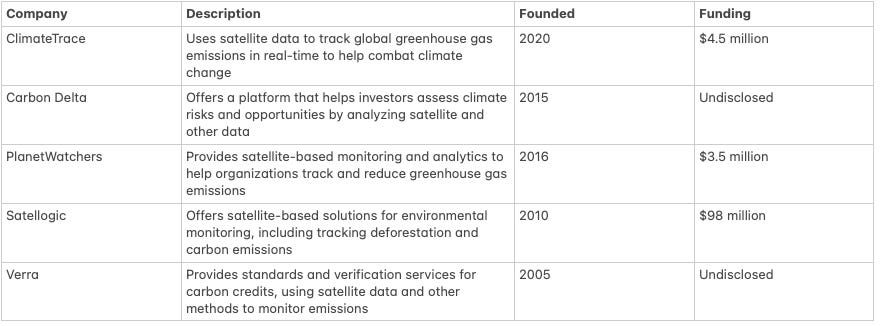Why Satellite Data is the Key to Accurate Carbon Credit Verification
Unlocking the Potential of Satellite Data for Accurate Carbon Credit Verification.
Carbon credits are a popular way for companies to offset their greenhouse gas emissions and demonstrate their commitment to sustainability. However, the accuracy of carbon credit verification is critical to ensuring that these efforts effectively reduce global carbon emissions. This is where startups that utilize satellite data can play a crucial role.
According to the International Energy Agency, global carbon emissions must decrease by 45% by 2030 to reach net-zero emissions by 2050. This presents a significant opportunity for startups leveraging satellite data to provide accurate and efficient carbon credit verification tools.
Satellite data provide a more comprehensive and objective view of carbon emissions, making it a valuable tool for accurate carbon credit verification. Startups can utilize this technology to offer innovative solutions for monitoring and verifying carbon emissions, which can help companies reduce their carbon footprint and achieve their sustainability goals.
One of the most significant advantages of using satellite data for carbon credit verification is its ability to provide real-time, high-resolution data on carbon emissions. According to a report by the European Space Agency, satellite data can reduce the time and cost of carbon credit verification by up to 50%. Startups can use this data to develop advanced monitoring tools that allow for more accurate and frequent emissions monitoring, as well as the ability to detect and respond to changes in emissions more quickly.
There are already startups that are using satellite data for carbon credit verification. For example, ClimateTrace uses satellite data to track global greenhouse gas emissions in real-time to help combat climate change. Similarly, PlanetWatchers provides satellite-based monitoring and analytics to help organizations track and reduce greenhouse gas emissions.
Looking to the future, there are many potential opportunities for startups to leverage satellite data for carbon credit verification. According to a report by Frost & Sullivan, the global carbon credit verification and trading market is expected to reach $350 billion by 2030, presenting a significant growth opportunity for startups. Startups could use artificial intelligence and machine learning algorithms to analyze satellite data and develop more accurate and efficient carbon credit verification tools. They could also create new applications for satellite data, such as monitoring carbon emissions from the shipping and aviation industries.
However, there are challenges and limitations to using satellite data for carbon credit verification, such as data availability and quality issues and the need for regulatory frameworks and standards. But for startups willing to tackle these challenges, the potential benefits for the environment and the economy make satellite data a valuable tool for the future.
In conclusion, startups that utilize satellite data have a unique opportunity to provide innovative solutions for accurate carbon credit verification. By providing real-time, high-resolution data on carbon emissions, startups can help ensure that carbon credits effectively reduce global carbon emissions and contribute to a more sustainable future.




